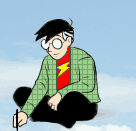The Infographic that Ate Comics
February 3rd, 2011
Damian Niolet recently sent word of a giant infographic he created as a personal cheatsheet showing…
Um…
Well, here’s his (perhaps a bit tongue-in-cheek) description from the graphic itself:
“A graphical representation of the process of creating a work of fiction in comic book form and the tools and knowledge necessary to do so, as based on the theories and works of Scott McCloud (with some minor additional concepts from Damian Niolet).”
It’s big, beautiful, and kinda terrifying (to me at least), and if you want to download a hi-res copy, you can find a link to do so either here or here.
I have a weird job!















Just….wow. You’re right it is vaguely terrifying! Also kind of cool though!
A weird but brilliant job. Isn’t it gratifying to know that your work continues to create dialogue and inspire innovation? I think it’s fantastic.
And now, off to see what Damian added.
I feel the perverse and self-serving need to point out that about 95% of the area of this chart applies just as much to anyone doing a photoshopped photography comic as to a drawn comic.
Thanks so much for the nod Scott, and for the kudos everyone!! I really don’t think it is anything special, at least when compared to the books the cheat sheet was based on, but I’m grateful for the praise all the same! Now I just need to find the time to apply the principles within!! More to come from <— guy! In time.
Well Scott,
You’ve been replaced.
@ Matthew Marcus: I say thee NAY!!!! Scott could never be replaced!
That chart is crazy-looking. It’s like the flow chart to all art ever created.
Couldn’t there just be a flowchart instead?
Ummm, isn’t it flow chart already? How would it be different as a flow chart?
I really want a print of this to hang over my drawing table!
I particularly like the little resources section. It’s just like a poster for school, except the design kid was given two years to make it.
Is my understanding correct that this could be classed (under McCloud law) as a comic. Not that your books seem to exclude a huge amount, but would this be considered “comics?”
If it did actually fit a loophole in my definition, it’d just be like one of those birds getting its head stuck in those plastic soda rings on the beach.